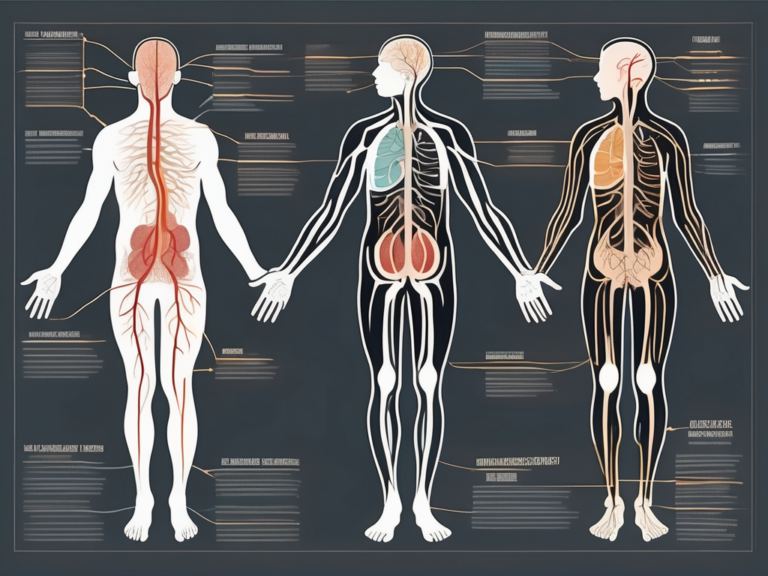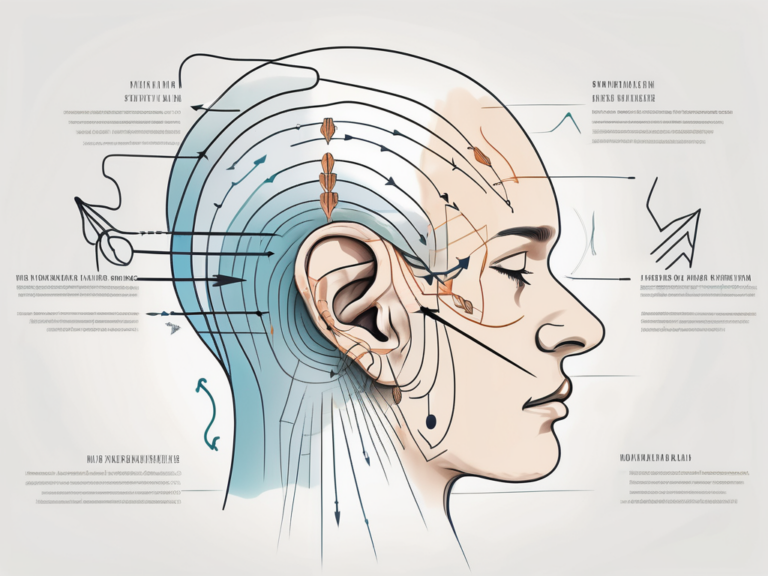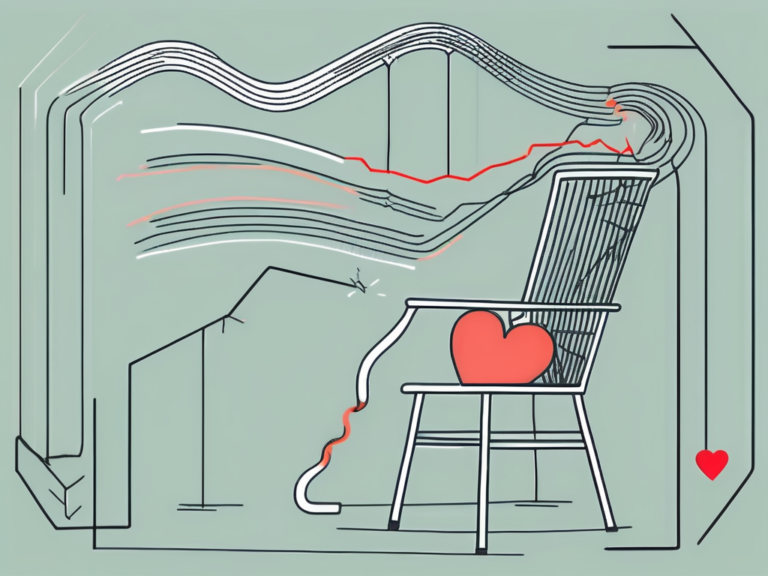Understanding the Vestibulo Cochlear Nerve: Functions and Disorders
The Vestibulo Cochlear Nerve, also known as the VIIIth cranial nerve, plays a crucial role in our ability to hear and maintain balance. With its complex anatomy and intricate functions, it is essential to have a comprehensive understanding of this nerve and the potential disorders that can affect it. In this article, we will delve into the anatomy, functions, common disorders, symptoms, diagnosis, treatment options, and prevention strategies related to the Vestibulo Cochlear Nerve.
Anatomy of the Vestibulo Cochlear Nerve
The Vestibulo Cochlear Nerve consists of two crucial components: the vestibular and cochlear nerves. These intricate nerves play a vital role in our sensory perception and balance. The vestibular nerve originates from the vestibular labyrinth, a complex structure within the inner ear that detects motion and spatial orientation. On the other hand, the cochlear nerve emerges from the cochlea, a snail-shaped organ responsible for our sense of hearing. Together, these nerves form a crucial link between the inner ear and the brain, allowing us to interpret and respond to auditory and vestibular stimuli.
Location and Structure
The Vestibular component of the Vestibulo Cochlear Nerve is a marvel of biological engineering. It is divided into the superior and inferior vestibular nerves, each playing a distinct role in transmitting sensory information. The superior vestibular nerve detects rotational movements of the head, while the inferior vestibular nerve senses linear acceleration. These signals travel along the nerve fibers to reach the vestibular nuclei located in the brainstem, where they are integrated and processed to maintain our sense of balance and spatial orientation.
The Cochlear segment of the nerve is equally fascinating in its complexity. It is intricately connected to the cochlea, a delicate structure that transforms sound waves into electrical impulses. The cochlear nerve carries these impulses to the cochlear nuclei in the brainstem, where they are further refined and transmitted to higher auditory centers in the brain. This intricate process allows us to perceive and interpret a wide range of sounds, from whispers to thunderous roars, enriching our auditory experience.
Connection to the Brain and Ear
The Vestibulo Cochlear Nerve serves as a vital bridge between the inner ear and the brain, facilitating the transmission of sensory information essential for our daily functioning. The vestibular component establishes connections with the vestibular nuclei in the brainstem, where reflexes for maintaining balance and coordinating eye movements are initiated. Simultaneously, the cochlear component forms connections with the cochlear nuclei, which play a crucial role in processing auditory signals. These nuclei serve as relay stations, transmitting information to higher brain centers responsible for sound perception and localization. Through this intricate network of connections, the Vestibulo Cochlear Nerve enables us to appreciate the symphony of sounds around us and navigate the world with grace and precision.
Functions of the Vestibulo Cochlear Nerve
The Vestibulo Cochlear Nerve plays crucial roles in both hearing and balance. Understanding these functions is vital in comprehending the impact of disorders affecting this nerve.
The Vestibulo Cochlear Nerve, also known as the eighth cranial nerve, is a paired nerve responsible for carrying sensory information from the inner ear to the brain. It consists of two main components: the cochlear nerve, which is involved in hearing, and the vestibular nerve, which is involved in balance and spatial orientation.
Role in Hearing
The cochlear component of the Vestibulo Cochlear Nerve is responsible for our ability to hear and interpret sound. It transmits auditory information from the cochlea to the brainstem, where it is processed and analyzed. This allows us to perceive and differentiate various sounds, from soft whispers to loud music.
Within the cochlea, specialized hair cells convert sound vibrations into electrical signals that are then transmitted through the Vestibulo Cochlear Nerve to the brain. The brain processes these signals, allowing us to not only hear sounds but also understand speech, music, and other auditory stimuli.
Role in Balance
The vestibular component of the Vestibulo Cochlear Nerve is essential for maintaining balance and spatial orientation. It provides the brain with information about head movements, accelerations, and changes in body position. This information is vital for coordinating movements and ensuring postural stability.
The vestibular system, which includes the vestibular nerve, semicircular canals, and otolith organs, detects changes in head position and movement. This information is crucial for reflexively adjusting muscle activity to keep us steady on our feet, maintain posture, and stabilize our gaze during movement.
Common Disorders of the Vestibulo Cochlear Nerve
Unfortunately, the Vestibulo Cochlear Nerve can be susceptible to various disorders that can significantly impact hearing and balance. Let’s explore two common disorders:
Vestibular Neuritis
Vestibular Neuritis is characterized by inflammation of the vestibular nerve, leading to a sudden onset of severe vertigo, dizziness, and imbalance. It often follows a viral infection and can cause debilitating symptoms that affect daily life activities. Prompt diagnosis and appropriate treatments, such as medication and vestibular rehabilitation, can aid in recovery and symptom management.
During an episode of Vestibular Neuritis, individuals may experience intense spinning sensations, nausea, and difficulty with coordination. The inflammation of the vestibular nerve disrupts the signals sent from the inner ear to the brain, resulting in the sensation of vertigo. This condition can be particularly challenging as it may lead to falls and impact an individual’s ability to perform routine tasks.
Meniere’s Disease
Meniere’s Disease is a chronic condition that affects the inner ear. It is characterized by recurring episodes of vertigo, fluctuating hearing loss, tinnitus (ringing in the ear), and a feeling of fullness in the affected ear. The exact cause of Meniere’s Disease is still unclear, but treatments such as diuretics, dietary changes, and vestibular rehabilitation can help alleviate symptoms and improve quality of life.
Individuals with Meniere’s Disease often describe the sensation of vertigo as a spinning or whirling feeling that can last for several hours. The fluctuating hearing loss associated with this condition can be distressing, affecting one’s ability to communicate effectively. Tinnitus, another common symptom, adds to the burden by causing a persistent ringing or buzzing sound in the ear, further impacting daily activities.
Symptoms and Diagnosis of Vestibulo Cochlear Nerve Disorders
Recognizing the symptoms of Vestibulo Cochlear Nerve disorders is crucial for timely diagnosis and appropriate treatment. Let’s explore the common symptoms and the diagnostic tests and procedures used in evaluating these disorders.
Vestibulo Cochlear Nerve disorders, also known as cranial nerve VIII disorders, encompass a range of conditions affecting the vestibular and cochlear nerves. These two nerves play a vital role in transmitting sensory information related to balance, spatial orientation, and sound perception to the brain. Dysfunction in either of these nerves can lead to a variety of debilitating symptoms that require careful assessment and management.
Identifying Symptoms
Patients with Vestibulo Cochlear Nerve disorders may experience distinct symptoms such as vertigo, dizziness, hearing loss, tinnitus, balance problems, and nausea. These symptoms can significantly impact daily activities, emotional well-being, and overall quality of life. Consulting a healthcare professional for a comprehensive evaluation is essential to determine the underlying cause and develop an appropriate treatment plan.
Vertigo, a sensation of spinning or dizziness, is a hallmark symptom of vestibular nerve disorders. It can be triggered by changes in head position, sudden movements, or even during stationary activities. Hearing loss and tinnitus, a ringing or buzzing sound in the ears, are common manifestations of cochlear nerve dysfunction. Balance problems, such as unsteadiness or difficulty walking in a straight line, can also be indicative of vestibular nerve involvement.
Diagnostic Tests and Procedures
To diagnose Vestibulo Cochlear Nerve disorders, healthcare professionals may employ various tests and procedures. Auditory tests, such as pure-tone audiometry and speech audiometry, assess hearing loss and provide critical insights into the functioning of the cochlear nerve. Vestibular tests, including electronystagmography (ENG) and videonystagmography (VNG), evaluate balance function and help identify abnormalities in the vestibular system. Magnetic resonance imaging (MRI) scans may be ordered to examine the nerve’s structure and rule out other potential causes of symptoms.
Additionally, vestibular evoked myogenic potentials (VEMP) testing can assess the function of the otolithic organs within the inner ear, which are crucial for detecting head movements and maintaining balance. This test measures muscle responses in the neck and eye movements in response to sound or vibration stimuli, providing valuable information about the integrity of the vestibular system. Comprehensive assessment through a combination of these tests helps healthcare providers pinpoint the specific nature and extent of Vestibulo Cochlear Nerve disorders, guiding them in formulating individualized treatment strategies for patients.
Treatment Options for Vestibulo Cochlear Nerve Disorders
When it comes to the treatment of Vestibulo Cochlear Nerve disorders, a multidisciplinary approach is often employed. Let’s explore some common treatment options:
Vestibulo Cochlear Nerve disorders can have a significant impact on a person’s quality of life, affecting their balance, hearing, and overall well-being. In addition to the conventional treatment options, there are emerging therapies and technologies that show promise in managing these complex disorders. One such innovative approach is the use of virtual reality (VR) technology in vestibular rehabilitation. VR-based exercises can create immersive environments that challenge the vestibular system and help improve balance and spatial orientation.
Medications and Therapies
Medications can help manage the symptoms associated with Vestibulo Cochlear Nerve disorders. For example, anti-vertigo medications, such as vestibular suppressants and antiemetics, can alleviate vertigo and nausea. Additionally, therapies like vestibular rehabilitation aim to retrain the brain and improve balance function. These exercises, guided by trained therapists, can significantly reduce dizziness and improve overall balance.
Another promising avenue in the treatment of Vestibulo Cochlear Nerve disorders is the use of dietary modifications and supplements. Some studies suggest that certain nutrients, such as magnesium and vitamin D, may play a role in supporting vestibular function. A well-balanced diet rich in these nutrients, along with targeted supplements, could potentially complement traditional treatment approaches and enhance outcomes for patients.
Surgical Interventions
In severe cases of Vestibulo Cochlear Nerve disorders, surgical interventions may be necessary. Cochlear implants can be considered for patients with profound hearing loss, bypassing the damaged cochlear nerve and directly stimulating the hearing centers in the brain. For specific vestibular disorders, surgical procedures such as labyrinthectomy or vestibular nerve sectioning can be performed to alleviate vertigo and improve balance control. These surgical interventions require careful evaluation and are usually considered after all conservative measures have been exhausted.
Prevention and Management of Vestibulo Cochlear Nerve Disorders
While not all Vestibulo Cochlear Nerve disorders can be prevented, there are strategies that individuals can adopt to minimize the risk and manage their condition effectively:
Understanding the complexities of the Vestibulo Cochlear Nerve and the potential disorders that can affect it is crucial for both healthcare professionals and individuals. The Vestibulo Cochlear Nerve, also known as the eighth cranial nerve, is responsible for transmitting sensory information related to balance and hearing from the inner ear to the brain. Disorders affecting this nerve can lead to symptoms such as vertigo, dizziness, hearing loss, and imbalance. By recognizing the symptoms, seeking timely diagnosis, and implementing appropriate treatment strategies, the impact of Vestibulo Cochlear Nerve disorders can be minimized, leading to improved function, enhanced well-being, and a better quality of life.
Lifestyle Changes
Lifestyle modifications can play a crucial role in managing Vestibulo Cochlear Nerve disorders. Reducing triggers such as caffeine, salt, and alcohol can help minimize symptoms of conditions like Meniere’s Disease. Incorporating stress management techniques, such as yoga or meditation, can also aid in symptom control. Additionally, adequate hydration and sufficient rest are important factors in supporting the overall health of the Vestibulo Cochlear Nerve. Maintaining a healthy diet rich in nutrients like magnesium, vitamin D, and omega-3 fatty acids, as well as engaging in regular physical activity, can contribute to overall well-being and improve balance control.
Regular Check-ups and Monitoring
Regular check-ups with healthcare professionals are essential for monitoring the condition and adjusting treatment strategies accordingly. Ongoing evaluation of symptoms and functional assessments allow for timely interventions and potential improvements in quality of life. Hearing tests, balance assessments, and imaging studies may be conducted to assess the function of the Vestibulo Cochlear Nerve and identify any underlying issues that require attention. Collaborating with a multidisciplinary team of healthcare providers, including otolaryngologists, audiologists, physical therapists, and mental health professionals, can ensure comprehensive care and optimal outcomes for individuals with Vestibulo Cochlear Nerve disorders.






